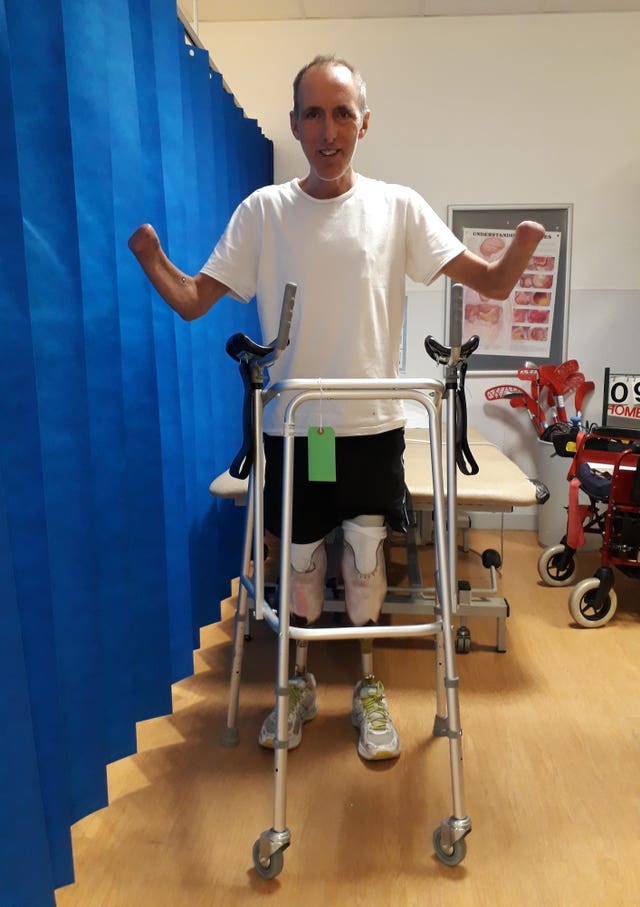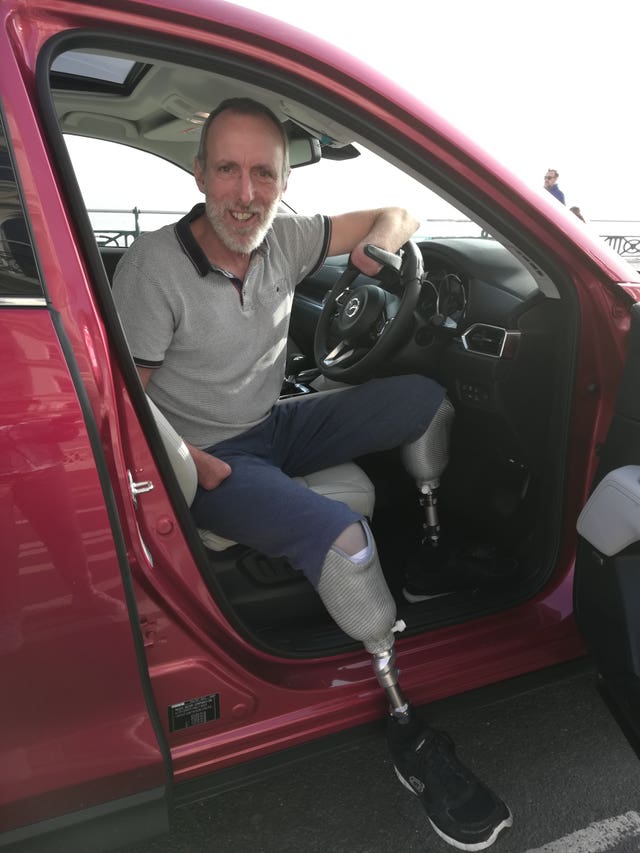
A man who almost died from meningitis has told how he looked forward to having his hands and legs amputated.
Mike Davies, 60, from Brighton, East Sussex, was suffering so much that he wanted his limbs removed and had to endure a 70-day stay in intensive care.
Now, with the help of prosthetic limbs, he is able to drive a specially-adapted car and is living life to the full, including holding his own pint of beer.

Mr Davies became ill with meningococcal meningitis and septicaemia at Christmas in 2017.
He said: “My wife Julie and I had just moved to Brighton. We had just about unpacked all the removal boxes when it was time to get the Christmas decorations out.
“And there I was, wrapping one last present on the afternoon of Christmas Eve when I began to get colder and colder.
“Climbing into bed didn’t help. When I finally came downstairs, I looked like a ghost with blue lips.
“My family insisted on the trip to the Royal Sussex County Hospital where the fantastic NHS clicked in.
“A&E became triage and that quickly became the intensive care unit.”
Machines took over Mr Davies’ vital functions and, at one point, his son Rory counted 26 tubes or lines going into his body.
Mr Davies said: “A rash appeared on my face which did not blanch. The bacteria was meningitis.
“Julie and Rory were taken to a room in the early hours of Christmas Day and told that I was not responding to any of the medication, and that I was unlikely to make it.
“Rory made sure he said everything he wanted to me. When they held my hand, I could not feel it. My hands and feet were dying.

“I spent 10 weeks in intensive care – that’s 70 days and nights on the edge of survival with incredible staff giving incredible care.
“During this time I began to look forward to having my hands and feet amputated.
“I knew they were dead and I would recover better without them. I was on a lot of medication and I was very accepting that they needed to go for me to make a recovery.
“My legs went one week, hands the next. The hands took seven hours alone.”
14 million people around the world are estimated to be living with an after-effect following meningitis – including limb loss, brain damage, or severe skin scarring.
April 24th is #WorldMeningitisDay. With your help, we can defeat meningitis wherever it exists – for good. pic.twitter.com/ycoUz7xzKM
— Meningitis Research (@M_R_F) April 22, 2019
Mr Davies spent weeks in hospital recovering before a two-and-a-half month stint at Queen Mary’s University Hospital in Roehampton learning to walk again on prosthetic legs.
He said: “My message to anyone who has amputations would be not to give up.
“I’ve had a lot of challenges to overcome but learning to do something again for the first time is a huge deal.
“I have since walked three miles on my prosthetic legs and I now drive myself in an adapted car.
“It’s amazing what you cannot do without hands but also amazing what you can. Problem-solving becomes an art.
“My fabulous wife Julie made a wrist-strap to hold a stylus that even today enables me to type, one key at a time, on the computer.
“Without using prosthetic hands, I am able to feed myself using a wrist strap for cutlery. I can even hold a pint of beer.
“For a long time I had to have my blood detoxified three times a week at dialysis in hospital as my kidneys were so badly affected, but I could have died.
Would you feel comfortable explaining the "meningitis rash" to someone? Are you sure you know what it is? Would you know what to do if the rash doesn't appear, but all other symptoms suggest meningitis…?
If not, click here: https://t.co/A8JiCdW4Uo to find out.
— Meningitis Research (@M_R_F) April 22, 2019
“With the NHS’s help, I survived.
“I feel in quite a positive place in my mind about the challenges I still have to overcome. Support from other people has been key. I am a lucky man.”
The Meningitis Research Foundation has created a new digital support service and Meningitis Progress Tracker, which shows that, in 2017, an estimated 42 million years of healthy life were lost around the world as a result of the disease.
Between 20% and 40% of people who survive meningitis or neonatal sepsis are left with problems such as hearing loss, brain damage or amputations.

The foundation is working with partners including the World Health Organisation to create a Global Roadmap to Defeat Meningitis by 2030.
Its director of support Rob Dawson said: “Meningitis is a deadly disease that strikes without warning and for the first time we are seeing just how much it is impacting people around the world. To see that 42 million years of healthy life has been lost is shocking.
“Some people affected tragically lose their lives, and for family and friends left behind, bereavement can mean life will never again be the same. Many people who survive have to adjust to life-changing impairments.”


Comments: Our rules
We want our comments to be a lively and valuable part of our community - a place where readers can debate and engage with the most important local issues. The ability to comment on our stories is a privilege, not a right, however, and that privilege may be withdrawn if it is abused or misused.
Please report any comments that break our rules.
Read the rules here